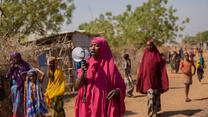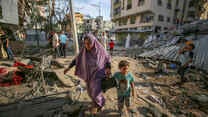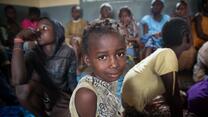In conflicts around the world, the targeting of civilians and their homes, schools, hospitals, and other infrastructure has become routine. People are cut off from food, water, and lifesaving assistance. The IRC advocates with global leaders for actions that uphold the laws of war, protect civilians in conflict, hold violators to account, and allow humanitarian organizations to have greater access to people in need.
In its annual Emergency Watchlist, the IRC highlights 20 humanitarian crises expected to deteriorate the most in 2022. Expert analysis has identified how the global system designed to protect civilians, prevent conflict, hold abusers to account, and guarantee that humanitarian aid reaches those in need is failing at all levels — and even driving conflict and suffering. Afghanistan, Ethiopia, and Yemen top the list of countries deemed most at risk of humanitarian deterioration in 2022. Most Watchlist countries - the top ten in particular - have experienced almost non-stop conflict over the last decade, hampering their ability to respond to global challenges like COVID-19 and climate change. This limited set of countries account for 89% of people in humanitarian need globally, 80% of global refugees and asylum seekers and 96% of attacks on humanitarians. Climate change is acting as a “pressure cooker” across Watchlist countries, contributing to rising violence and hunger and eroding response capacity. Four countries in East Africa - undermined by both conflict and a drought that is forecast to continue - appear in the top ten on this year’s Watchlist. The number of booster shots in high-income countries is more than triple the number of people fully vaccinated in Watchlist countries.
David Miliband, President and CEO at the IRC, said: “Every year the Watchlist is a sobering document. This year it is especially so. The record numbers of people in humanitarian need, record numbers of people without food to eat, record numbers of people on the run from violence and persecution, record numbers of civilians and aid workers exposed to extreme threats to life as well as livelihood, are shocking. They are also shaming, given that the resources of the world to feed and support its people have never been greater. All these records are driven by events in Watchlist countries - and for those living in the world’s most fragile and conflict-affected countries, the Watchlist shows that permanent crisis is the new normal."
Read our Watchlist 2022 report for more information, and our additional reports below to learn more about our work to aid civilians in conflict.



